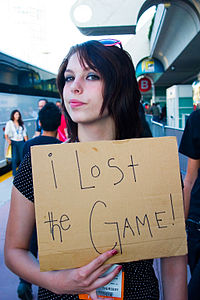The Game (mind game)
From Wikipedia, the free encyclopedia
The Game is an ongoing mind game, the objective of which is to avoid thinking about The Game itself. Thinking about The Game constitutes a loss, which, according to the rules of The Game, must then be announced. While one can avoid losing The Game by not currently thinking about it, one can never actually "win" The Game.
As of 2008, The Game is played by millions worldwide.[1][2][3][4][5]
Contents |
[edit] Rules
There are three main rules to The Game: [1][2][6][7][8]
- Everyone in the world is playing The Game. (Sometimes narrowed to: "Everybody in the world who knows about The Game is playing The Game,"[4] or alternatively, "You are always playing The Game.")
- Whenever one thinks about The Game, one loses.
- Losses must be announced (a statement such as "I lost The Game" is often used).
Variations of The Game exist. For instance, some players allow a grace period after they have lost once, during which a player cannot lose The Game again or is not obliged to announce a loss. This can range from just a few seconds to half an hour.[2] Some people claim that The Game ends when the British Prime Minister announces this on television.[6] No established sanctions exist for players breaking the rules of The Game.
[edit] Strategies
Some players have developed strategies for making other people lose, such as writing about The Game on hidden notes, as graffiti, and on banknotes.[4][5] The Game has been described both as pointless and infuriating, and as a challenging game that is fun to play.[2] Other strategies involve distracting oneself so as to forget, and also to learn "I lost" in another language.
[edit] Origin
The origins of The Game are uncertain. One theory is that when two men missed their last train and had to spend the whole night on a platform, they tried not to think about their situation and whoever did first, lost.[1] Another is that it was invented in London in 1996 "to annoy people". The reported earliest reference on the Internet is from 2002.[2] The Game is an example of ironic processing, also known as the White Bear Phenomenon, in which attempts to avoid certain thoughts make those thoughts more persistent.[9][10] A classic example of ironic processing is Dostoevsky's quote: “Try to pose for yourself this task: not to think of a polar bear, and you will see that the cursed thing will come to mind every minute.”
[edit] See also
Cultural phenomena:
Other unconventional games:
[edit] References
| Wikimedia Commons has media related to: The Game (mind game) |
| Wikinews has related news: Wikinews interviews manager of site 'Lose The Game' |
- ^ a b c "If you read this you have lost the game". The Metro. 2008-12-05. http://www.metro.co.uk/news/article.html?If_you_read_this_youve_lost_The_Game&in_article_id=430703&in_page_id=34.
- ^ a b c d e Montgomery, Shannon (2008-01-17). "Teens around the world are playing 'the game'". The Canadian Press. http://www.ctv.ca/servlet/ArticleNews/story/CTVNews/20080117/thegame_youlose_080117.
- ^ Boyle, Andy (2007-03-19). "Mind game enlivens students across U.S.". The Daily Nebraskan. http://media.www.dailynebraskan.com/media/storage/paper857/news/2007/03/19/ArtsEntertainment/Mind-Game.Enlivens.Students.Across.U.s-2779474.shtml.
- ^ a b c Verelst, Jeroen (2007-03-15). "The Game, het eenvoudigste spel ter wereld" (in Dutch) (Subscription required). De Morgen: p. 2. http://www.demorgen.be/archief/artikel.html?i=ODM5Nw==.
- ^ a b Rooseboom, Sanne (2008-12-15). "Nederland gaat nu ook verliezen". De Pers. http://www.depers.nl/entertainment/269673/Nederland-gaat-nu-ook-verliezen.html.
- ^ a b "The three rules of the game". The Metro. 2008-12-05. http://www.metro.co.uk/news/article.html?Three_rules_of_The_Game&in_article_id=430704&in_page_id=34.
- ^ "Don't think about the game" (Subscription required). Rutland Herald. 2007-10-03. http://nl.newsbank.com/nl-search/we/Archives?p_product=MCNP&p_multi=RHDB&p_theme=mcnp&p_action=search&p_maxdocs=200&p_topdoc=1&p_text_direct-0=11C0ED30E5F12A50&p_field_direct-0=document_id&p_perpage=10&p_sort=YMD_date:D&s_trackval=GooglePM.
- ^ Wettschreck, Justine (2008-05-31). "Playing 'The Game' with the other kids" (Subscription required). Daily Globe (Worthington). http://www.dglobe.com/articles/index.cfm?id=12028§ion=Opinion&freebie_check&CFID=44302018&CFTOKEN=70154493&jsessionid=8830ec90e35e58254a5e.
- ^ Kaniewski, Katie (1 March 2009). "You just lost the Game". Los Angeles Loyolan. http://www.laloyolan.com/entertainment/you-just-lost-the-game-1.1589859. Retrieved on 2009-03-27.
- ^ Pollard, Gabriel (7 June 2008). "Wikinews interviews manager of site 'Lose The Game'". Wikinews. http://en.wikinews.org/wiki/Wikinews_interviews_manager_of_site_%27Lose_The_Game%27. Retrieved on 2009-03-27.
[edit] External links
- The webcomic xkcd refers to The Game.


